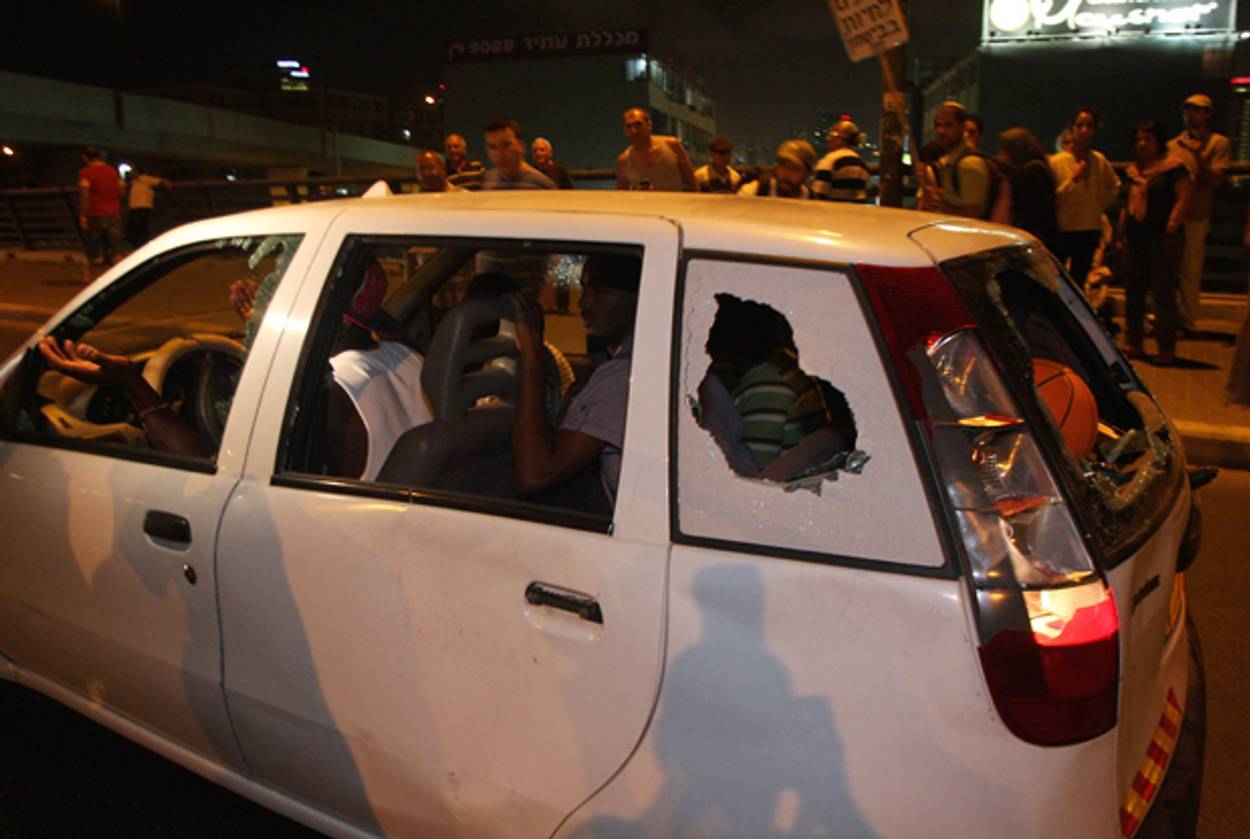Anti-African Migrant Protest Turns Violent
Tel Aviv riot was incited by some politicians; political failure is general




In southern Tel Aviv, 1,000 “protesters”—they began as protesters, ended as rioters, assailants, worse—demanded the detention and/or deportation of the recent influx of Africans who have come to Israel seeking asylum from various horrors, notably the wars and ethnic cleansings of Sudan (many hail from what is now the young country of South Sudan, and many from similarly war-torn Eritrea). Africans were attacked and called “infiltrators”; their cars and businesses had their windows smashed. As several have noted, the word for this is “pogrom.” 17 were arrested, and Prime Minister Netanyahu condemned the incident; Israel is considering sending the Border Guard to pacify the neighborhood.
The easy thing to do would be to chalk this race riot up to bad apples. But that would elide its most significant dynamic: that these protesters were incited, if not actually to violence then at least to extremes of fear and hatred, by prominent right-wing politicians. Likud MK Danny Danon, famous for proposing the annexation of much of the West Bank, called for the migrants—“infiltrators,” to use his word, borrowed from the violent protesters—to be evacuated immediately. “The Sudanese were a cancer on our body,” said his Knesset and Likud colleague Miri Regev. Indeed, according to Peace Now, which has called for an official probe into whether these politicians incited the mob, Regev, Danon, Yariv Levin, and Michael Ben Ari attended the protest. In an eyewitness dispatch, Ilan Lior reports that Ben Ari, of National Union, called them “rapists” (there have been reports of rape in the neighborhood). Shas’ Eli Yishai has used troubling language and also referred to them as “infiltrators.”
More broadly, Noam Sheizaf convincingly argues that blame for the situation that led to last night’s melee lies with the government’s policy of malign neglect toward the 60,000 asylum-seekers, who have settled in poor neighborhoods throughout the country, including south Tel Aviv, where they bump up against Jewish populations that are themselves poor (predominantly Mizrahi, too) and therefore ripe to resent these “intruders” (think poor whites in the South or in Boston during the civil rights era). As Daniella Cheslow reported in Tablet Magazine more than a year ago, the real problem is a total vacuum in terms of government policy.
The grown-up in the room appears to be Knesset speaker Reuven Rivlin, also of Likud, who denounced politicians’ immoderate language and called on the government to develop policies that deal with the real problem in accordance with “Jewish values, which also seeks to protect and help the helpless.” Writing in Haaretz today, one asylum-seeker articulated the basic hypocrisy at the heart of Israel’s non-policy: “If those in the government do not want us to be here, then let them deport us. But they can’t have it both ways—not deport us and also not give us basic conditions to live here. That is exploitation.” He adds, “I just want to live in safety. I agree to be deported to any African country, other than Sudan. I just want to live with dignity, without people talking about the color of my skin, and I want to stop feeling hostility on the streets.”
“It started as a legitimate protest,” Lior reports. “South Tel Aviv residents objected to the government’s policy, or more accurately, the government’s lack of policy. Over the course of a few years, tens of thousands of Africans have made their way into the neighborhoods of south Tel Aviv. Residents call them infiltrators, others call them refugees or asylum seekers.” He adds, “If it weren’t for the police presence, it would have ended in lynching. I have no doubt.”
The name of the neighborhood in which all this went down? Hatikva. Makes you feel sick.
Demonstrators Attack African Migrants in South Tel Aviv [Haaretz]
Day After Violent Anti-African Protest, Likud MK Calls to ‘Distance Infiltrators’ Immediately [Haaretz]
‘Peace Now’ Calls for ‘Incitement’ Probe of Anti-Violence MKs [Arutz Sheva]
How Mainstream Israeli Politicians Sparked the Tel Aviv Race Riot [+972]
Rivlin: ‘Lawmakers Must Guard Their Words!’ [Arutz Sheva]
An African Migrant’s Plea for a Few Basic Rights [Haaretz]
How a Tel Aviv Anti-Migrant Protest Spiraled Out of Control [Haaretz]
Related: Out of Place [Tablet Magazine]
Marc Tracy is a staff writer at The New Republic, and was previously a staff writer at Tablet. He tweets @marcatracy.